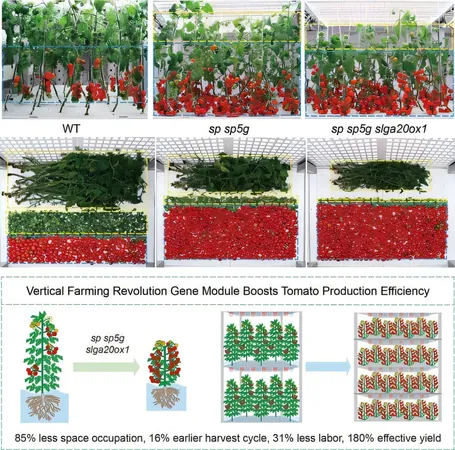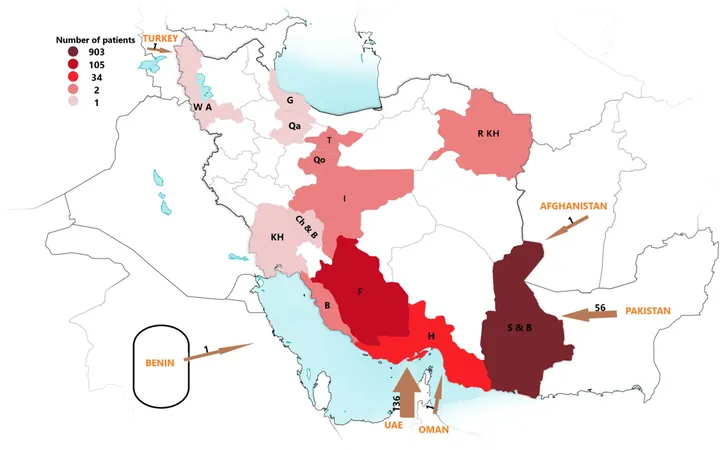
Revolutionizing Tomato Farming: Groundbreaking Genetic Edits Boost Vertical Farming Efficiency!
2025-05-28
Author: Ming
Transforming Tomato Production Soars to New Heights
In an exciting breakthrough for vertical farming, a dynamic research team led by Professor Xu Cao at the Institute of Genetics and Developmental Biology of the Chinese Academy of Sciences has engineered a new tomato variety specifically designed to thrive in plant factory systems. This innovative approach has significantly boosted production efficiency, paving the way for a new era in agriculture.
Unlocking the Secrets of Vertical Agriculture
Published in the esteemed Journal of Integrative Plant Biology, the team's findings reveal how integrating Green Revolution gene homologs with anti-florigen genes through genome editing can tackle persistent challenges in scaling up vertical farming operations. Vertical farms, which utilize controlled environments and vertical cultivation, are touted as a solution to pressing issues like climate change, reducing arable land, and increasing urbanization.
Confronting Energy Costs and Crop Limitations
However, success in this innovative farming model has been stymied by high energy demands and a limited selection of crops that can thrive indoors. Traditional fruiting vegetables, particularly tomatoes, cucumbers, and peppers, are not well-suited for the confined spaces of vertical farms due to their complex growth patterns.
A Game-Changing Genetic Approach
To overcome these obstacles, Prof. Cao's research team has successfully combined two powerful genetic modifications. By knocking out the SlGA20ox1 gene, they achieved a compact plant architecture that boasts short stems and a dense canopy, ideal for vertical farming. In commercial setups utilizing advanced multi-layer LED hydroponic systems, this genetic tweak resulted in a staggering 75% reduction in space used, coupled with a remarkable 38-69% increase in fruit yields.
Synchronized Growth Equals Higher Yields
Further combined efforts involving the SP and SP5G genes have led to accelerated flowering and synchronized fruit ripening, making the modified tomatoes not only more compact but also more efficient. This innovative sp sp5g slga20ox1 mutant achieved an astonishing 85% reduction in space occupancy, a 16% decrease in harvest cycles, and an incredible 180% boost in effective yield.
A Blueprint for Future Crops?
With gene pathways conserved across various crops, the team believes their groundbreaking module could facilitate the rapid customization of specialized varieties in other solanaceous vegetables. This research offers a promising pathway to tailor fruit and vegetable cultivars specifically for vertical farming, which could revolutionize food production and security well into the future.
The Future of Farming is Vertical!
As vertical farming emerges as a quintessential answer to modern agricultural challenges, this study highlights a transformative approach to produce not just tomatoes but potentially a plethora of vegetables, bringing us one step closer to sustainable and efficient urban agriculture.



 Brasil (PT)
Brasil (PT)
 Canada (EN)
Canada (EN)
 Chile (ES)
Chile (ES)
 Česko (CS)
Česko (CS)
 대한민국 (KO)
대한민국 (KO)
 España (ES)
España (ES)
 France (FR)
France (FR)
 Hong Kong (EN)
Hong Kong (EN)
 Italia (IT)
Italia (IT)
 日本 (JA)
日本 (JA)
 Magyarország (HU)
Magyarország (HU)
 Norge (NO)
Norge (NO)
 Polska (PL)
Polska (PL)
 Schweiz (DE)
Schweiz (DE)
 Singapore (EN)
Singapore (EN)
 Sverige (SV)
Sverige (SV)
 Suomi (FI)
Suomi (FI)
 Türkiye (TR)
Türkiye (TR)
 الإمارات العربية المتحدة (AR)
الإمارات العربية المتحدة (AR)